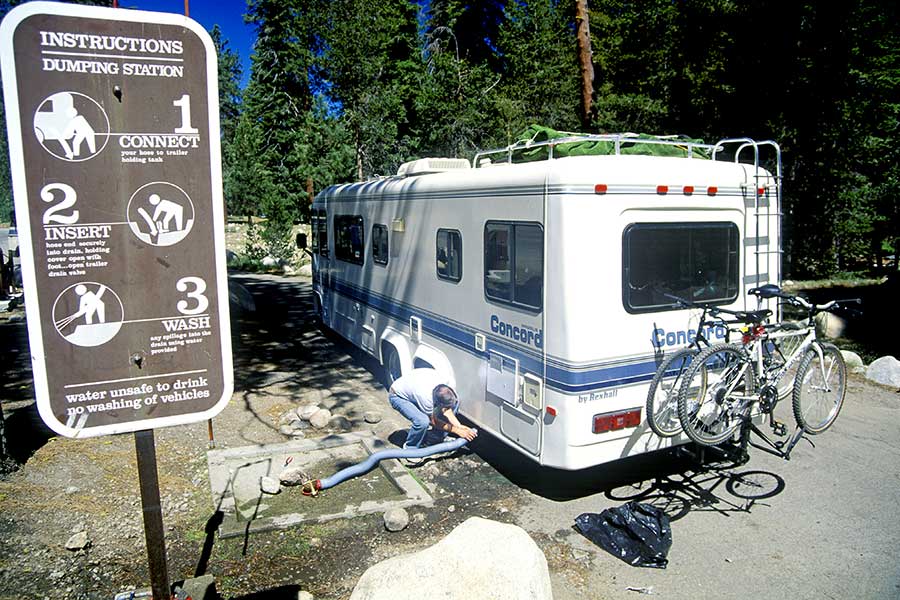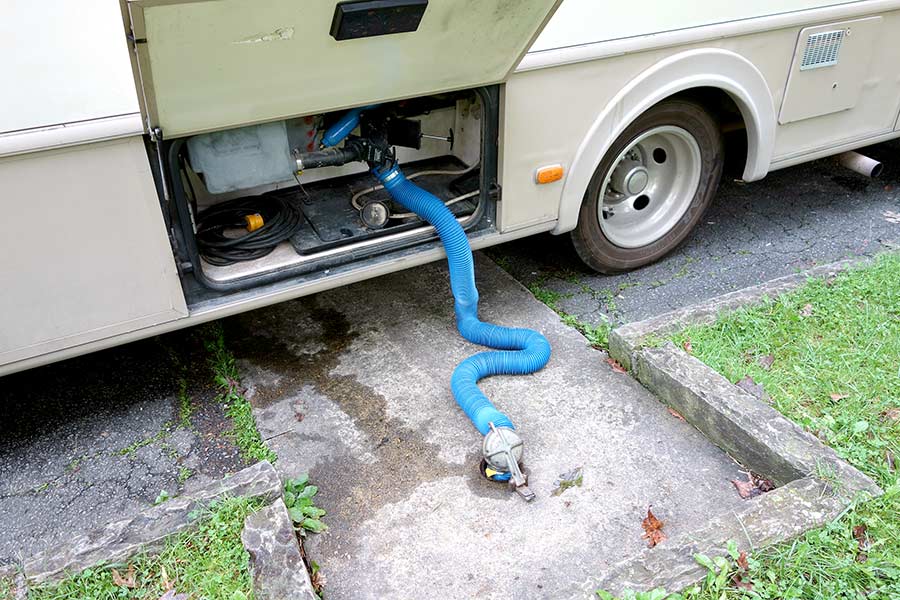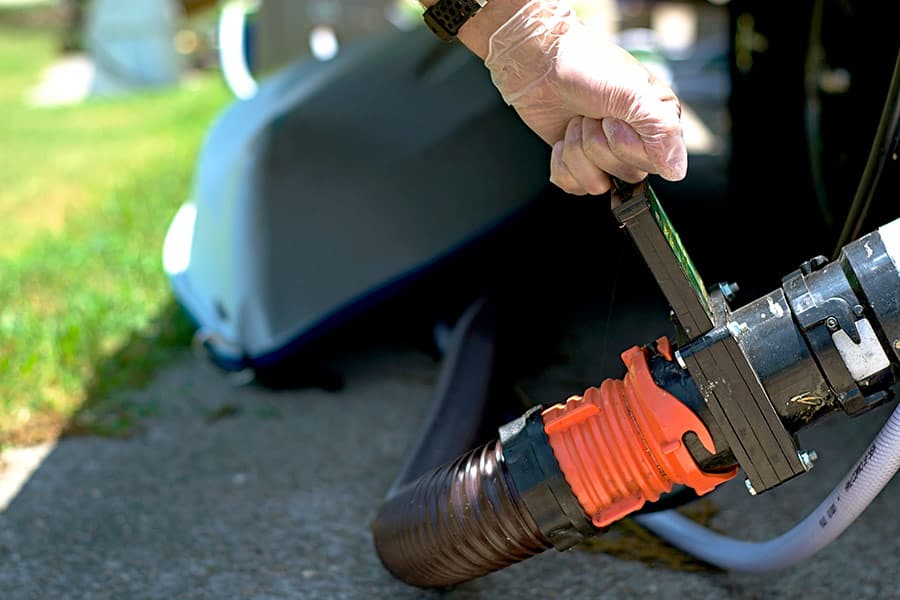
An RV represents a convenient means of traveling across the country with many of the conveniences of home. As with any vehicle, you should know its various systems and how they operate. Understanding the difference between gray and black water is essential for any RV owner or if you are going to rent one.
Gray water is all the wastewater that flows from the kitchen and bathroom sinks plus the shower of your RV, while black water is the water from the toilet that contains human waste. Most modern RVs have separate gray and black water tanks.
Black water is always unsafe because of the high levels of bacteria and must be disposed of with care. However, understanding if your RV has two separate tanks or a combined one and how to dispose of wastewater effectively is critical to know before you hit the road.
Taking this into account, here are a couple of things you should know about the differences between gray and black water and how to dispose of each effectively and safely.
Gray Water and Black Water – What is the Difference?
Gray water is all of the water that drains from your kitchen sink, shower, and bathroom sink; this means water used for washing dishes, bathing, or washing your hands. While this water can contain some bacteria, dish detergent, and food particles, it is considered much less contaminated than black water.
Black water is the product of human waste and associated toiletries. In some RVs, all used water goes to the black water tank, meaning it may be composed of the waters mentioned above, but once it is mixed with human waste, it becomes black water and is considered contaminated. Due to this factor, it must be disposed of properly.
The typical size of a black water tank is between 18 and 64 gallons, while a gray water tank will hold up to 50 gallons. It is also good to keep in mind that a freshwater tank will usually hold between 20 and 100 gallons. The wide range of sizes is due to the variety of RVs on the market. The bigger the RV, the larger the tanks. It is a good idea to familiarize yourself with the capacity of your tanks and where the monitor panel is for your specific model, as this can help you keep track of fluid levels.
Can You Dump RV Black Water on the Ground?
No, you can’t dump RV black water on the ground. Black water is a health hazard and dangerous to the environment due to the concentration of bacteria and other biological elements contaminating it. Black water should never be dumped outside of designated dump stations.
It is legal to dump this water at home, but it must flow into an approved residential sewer system. Dumping in other locations, such as a storm drain, is illegal and will result in a fine.
Other Posts of Interest
- Can Dogs Go Camping: A Complete Guide
- Is Dawn Dish Soap Safe For Camping?
- Is It Safe To Use A Public BBQ Grill?
- Why Is Lump Charcoal So Expensive?
Where Can I Dump Black Water from My RV?

Many locations may offer dump stations where you can empty your black water tank. The most common is RV parks and campgrounds. Any place with an approved area for RV’s to park is likely to have the amenities necessary to accommodate them, including a septic tank for offloading black water.
- Some campgrounds will have a “honey wagon,” which is a vehicle that empties holding tanks right at the campsite. These are more common at campgrounds that lack a sewage hookup at each site. However, some campgrounds offer both services.
- Gas stations/truck-stops, and stops near recreational areas are also common places to find approved dumping facilities, though it is best to contact these places ahead of time to make sure.
- RV dealerships can also be an option for RV users in a pinch, as these places often rent out their RVs, so it is necessary for them to have a dumping facility on site. For a small service fee, they may allow you to make use of it.
- Cabela’s and Camping World are two places to keep in mind, as in a lot of cases, they will have dump stations.
- There are also some less obvious options for black water dumping if the above options are unavailable. Wastewater treatment plants may offer an option for dumping black water, though such facilities are often further out of the way than the options mentioned above.
- Marinas may also be an alternative for those traveling near the coast or large bodies of water. Boat owners have similar needs when it comes to black and gray water, so the facilities to offload them should be available.
A note about tanks, your RV tanks can freeze in cold weather. You can heat your tanks with tank heaters, and this post will help you to know when to turn them on.
How Much Does It Cost to Dump a Black Water Tank?
You should be able to dump your tanks for anywhere between $5 to $15 each time, and most places will have a flush hose so you can finish the job up right.
However, if you want to save a few bucks, you can buy a Good Sam’s membership and get free dumping at Camping World and select Gander RV & Outdoors locations. And with the membership, you can get discounted dumping rates at places like Pilot Flying J plus discounts on other things like propane, fuel, camping at Good Sam Parks & Campgrounds, and more.
Also, many campgrounds offer the use of their dump station when you stay with them and can be part of your nightly fee when camping there.
How Often Do You Dump the Black Water Tank?
There is no cut-and-dry answer for when exactly to dump your black water tank as it is relative to the tank size and the number of passengers using it. For example, if only you and your spouse use the tank, you can likely go longer than with a whole family.
With that in mind, the best rule of thumb to follow is to dump your black water tank when it hits about two-thirds capacity. That way, it ensures it never overloads and, much like gassing up, offers some leeway to make sure you have it emptied before you absolutely need to have it emptied.
Besides, if you leave the tank fill fuller, there will be more force to help the dumping procedure go better. And if you empty the black water tank first, then the gray water tank, it will help clean the hose from anything leftover from emptying the black water tank.
However, if your RV doesn’t have any measure for black water or the sensor isn’t working (as so often is the case), the easiest way to check the tank is to shut the water off and look down the toilet. And, if your gray water tank is separate, one easy way to know if the tank is full is if the water is standing in the shower base.
Can You Dump RV Gray Water on the Ground?
While it is absolutely illegal to dump RV black water on the ground, and most RV owners understand that, it is less well-known that you cannot dump gray water on the ground either.
Though gray water often has far fewer bacteria than black water, it is in no way “clean water.” With that in mind, gray water can cause some harmful effects on the environment because it can contain chemicals from soap, detergent, and cleaners. It can also smell horrible, and as it might contain food particles, it can attract animals.
It is definitely illegal to dump both black and gray water on the ground at all National Parks, making any dumping of either water on Federal land a punishable offense.
How to Dispose of RV Gray Water

With options to dispose of gray water at campgrounds, as well as any of the aforementioned black water dump sites, it’s easy to find locations so long as you keep track of how full the tank is becoming. The gray water tank you will find fills faster than the black water tank, so sometimes you will need to dump it when you don’t necessarily need to empty the black water tank.
However, just like black water, there is often a small fee associated with dumping gray water. Though it isn’t everywhere, and sometimes the costs are minimal, regardless, it’s still important to keep in mind as you travel.
Can I Use Regular Toilet Paper in My RV?
This answer is left up to user discretion, but RV-safe toilet paper is designed to disintegrate very quickly in water so as not to clog the drain or tanks. However, that is also the fundamental design of toilet paper overall: to dissolve in water. Conversely, one reason why you should absolutely never flush a paper towel is that a paper towel is designed to absorb rather than dissolve in water.
With that in mind, it is also true that the “better quality” toilet paper is only more durable because it is thicker, and because of that, it reduces some of its ability to dissolve efficiently.
Therefore, though you don’t always have to buy RV-safe toilet paper for your RV, it’s probably a good practice not to buy the higher-end toilet paper that you might use in your home and stick with a single-ply that dissolves quick.
Final Thoughts
While not all RVs are built the same when it comes to the size of black and gray water tanks or if they even have separate tanks, the means of disposal are always the same. It is illegal to dump black water on the ground and improper and most-often unlawful to dispose of gray water either, anywhere except a dumping station.
Consequently, it’s essential to be mindful of your RV’s black and gray water tank levels, and when emptying, do with extreme care.






